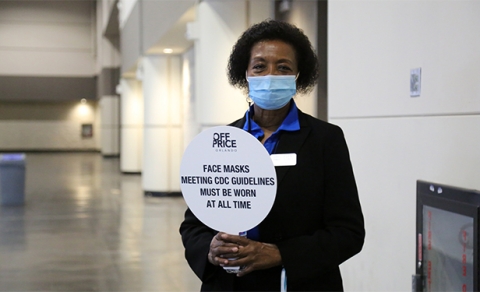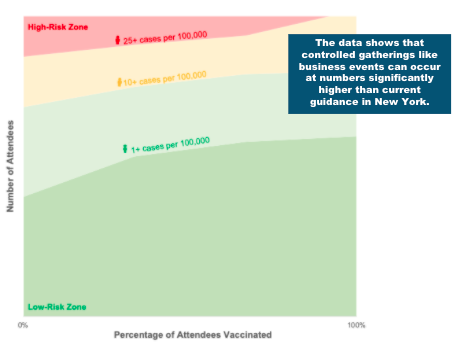ECA: Epistemix Partnership Puts Data at Center of Push to Re-Open

The Exhibitions and Conferences Alliance is turning to science as its best pitch to legislators to allow the full re-opening of business events.
Last week, ECA, through its Go LIVE Together campaign targeting local, state and federal lawmakers, announced a partnership with Epistemix, a leading analytics tool that forecasts the spread of infectious diseases. A scientific model conducted by Epistemix estimates that an event with 20,000 attendees this summer would have practically no COVID-19 transitions.
The data makes the case that current restrictions, like those in New York and what’s planned for when California re-emerges from the pandemic on June 15, unnecessarily limit the maximum number of attendees, which in turn diminishes the returns of an event and a destination’s economic impact.
“Epistemix provides data to let leaders know when and at what capacity it is safe to open through its models — and that even organizers will follow the science to ensure safety,” said Herve Sedky, president and CEO at Emerald. “It points to this being a more concrete, scientific approach, rather than a 'follow the generalize protocols' approach.”
 Epistemix, a well-regarded platform used by schools, governments, professional sports leagues and more, builds case studies to simulate how diseases like COVID-19 spread during an event. Its website includes graphics studying the effects of large-scale gatherings like the Chicago Marathon and a Pittsburgh Pirates baseball game.
Epistemix, a well-regarded platform used by schools, governments, professional sports leagues and more, builds case studies to simulate how diseases like COVID-19 spread during an event. Its website includes graphics studying the effects of large-scale gatherings like the Chicago Marathon and a Pittsburgh Pirates baseball game.
Through analysis, it is able to:
- Forecast the potential level of immunity at a given date based on historical infection rates at a given location, different assumptions about vaccination rates, and future potential impact of new variants
- Estimate the likely number of infectious people who may attend based on the size of the event and origin of attendees
- Calculate the number of infections we might expect at the event given the range of protective measures that could be implemented.
Such information is critical at a time when the events industry faces a dual responsibility in proving its importance to an economic recovery while being able to demonstrate safety is of utmost importance.
Leading trade show organizations, including Emerald, Informa Markets, Reed Exhibitions and The Tarsus Group have teamed with eight industry associations to form ECA, which aims to use one voice to make the industry’s case to U.S. decision-makers. All Secure Guidelines were developed as a baseline to demonstrate event organizers are often going above and beyond CDC and state mandates with protocols including:
- Mandatory mask mandates
- Daily temperature checks prior to entering a show floor
- Social distancing measures, including wider aisles and larger booths in many cases
- Continuous cleaning and sanitization efforts with an emphasis on high touchpoints
- Many convention centers and hotels across the country are GBAC Star certified.
With vaccinations occurring at a breakneck speed, ECA and its contributing organizations like IAEE, say the time is right to push lawmakers to ease limits on business events as have been done for large sports events. The “better safe than sorry” approach is overly cautious and has the potential to damage local economies. For instance, ECA’s press release said “attendee caps and burdensome testing and vaccine-verification requirements” that will be part of California’s grand reopening spurred the American Public Transportation Association’s 2021 conference and expo from the Anaheim Convention Center to the Orange County Convention Center in Orlando in November.
The OCCC has hosted many events, both pre-scheduled and relocated, during the pandemic. APTA said in a press release, “Orlando has hosted, and continues to host this year, large conventions and trade shows, and has demonstrated that its convention center and hotels are equipped with the necessary protocols and staffing to serve large groups.”
Desky noted that a trio of fashion shows in Orlando — MAGIC Pop-Up Orlando, OFFPRICE Orlando Market and WWIN Orlando Showcase — attracted 5,000 attendees and through the safety measures, led to no reports of COVID outbreaks.
ECA and Go LIVE Together hope that by taking Epistemix’s evidence to influential stakeholders, other such disruptions can be avoided.
A toolkit to pitch lawmakers can be found here.
“We should be smart and safe,” urged Sedky. “We need to continue to adhere to the accepted protocols — social distancing and masking. We should get vaccinated. And like ECA, groups should adopt this platform to develop science-based plans for future events. That is the best way to safely bring large-scale gatherings back in the U.S.”
Don’t miss any event-related news: Sign up for our weekly e-newsletter HERE and engage with us on Twitter, Facebook, LinkedIn and Instagram!


Add new comment